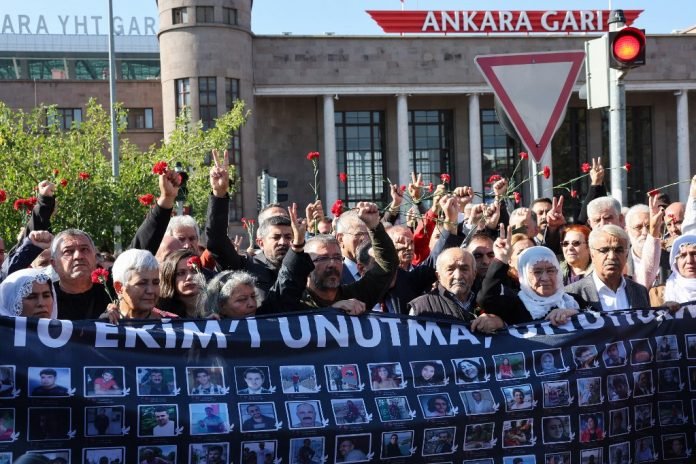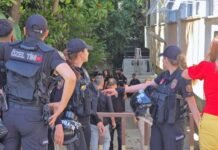
A Turkish court has handed down aggravated life sentences and additional prison time to 10 defendants who were retried due to their role in twin bombings in Ankara in 2015 that claimed the lives of more than 100 people, Turkish Minute reported, citing the Artı Gerçek news website.
The bombings on October 10, 2015 at the Ankara train station were the deadliest terrorist attack Turkey has ever experienced. The two blasts took place near the city’s central terminal as people from mainly leftist and pro-Kurdish groups gathered to stage a demonstration demanding peace and an end to an ongoing conflict between the outlawed Kurdistan Workers’ Party (PKK) and the Turkish government.
Two explosions went off as people were congregating in the square, killing 103 and injuring more than 500.
The Ankara Chief Public Prosecutor’s Office, which carried out an investigation into the bombings, indicted 26 suspects, 16 of whom were at large. The first hearing of the trial was held in November 2016.
The Ankara 4th High Criminal Court concluded the trial in August 2018 and handed down consecutive aggravated life sentences to 10 suspects on various charges including murder, violating the constitutional order and leading an armed terrorist organization.
The Supreme Court of Appeals overturned the sentences of some of the defendants, which required a retrial.
The final hearing in the retrial of the 10 defendants was held at the Ankara 4th High Criminal Court on Monday and was attended by family members of the victims, representatives from civil society organizations and pro-Kurdish Peoples’ Democracy and Equality (DEM Party) lawmaker Sevilay Çelenk.
The court handed down 101 consecutive aggravated life sentences on conviction of murder and 379 consecutive 18-year prison sentences on charges of attempted murder to each of the 10 defendants.
None of the defendants was convicted of committing crimes against humanity despite expectations from the victims’ families and lawyers.
The court decided to separate the files of the defendants at large.
The court’s decision has led to disappointment among the victims’ families, displeased over the fact that none of the defendants was convicted of crimes against humanity.
During the years-long trial, families also regretted the non-inclusion of any public official in the trial whose negligence might have played a role in the perpetration of the attack.
Although government officials said the Islamic State in Iraq and the Levent (ISIL) was responsible for the bombings, victims’ families have demanded to know if the attack could have been prevented by the authorities.
Almost nine years since the attack, none of the public officials who were found in a report drafted by the Interior Ministry to bear some responsibility for the attack have been put on trial.
A report drafted by the Interior Ministry revealed on Feb. 25, 2016 that some public officials bore some responsibility for the incident. According to the report, leaked to the media, intelligence that ISIL might stage an attack on gatherings by leftist and Kurdish groups in Ankara and other cities had been conveyed to the police. Moreover, the names of the train station bombers had also been mentioned several times in these intelligence notices.
The Ankara bombings took place in the period between June and November 2015, historically the most critical timeframe of the Turkish Republic that saw a series of terrorist attacks.














